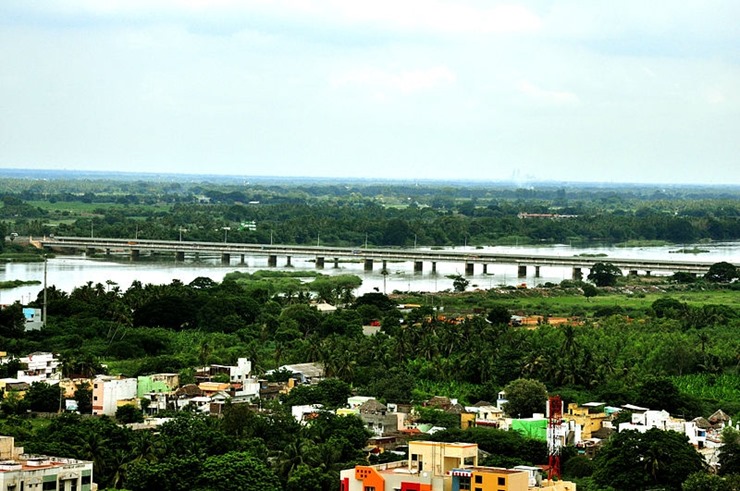
So, how did today’s much expected hearing on the Cauvery case go in the Supreme Court?
Well, it started at 2.25 pm and lasted for about an hour. The result can only be described as a damp squib.
After the Karnataka assembly passed a resolution asking its Government not to release water from Cauvery, the natural consequence would have been for the Supreme Court to issue a contempt notice to the State, right? But nothing of that sort happened today. How?
Well, it appeared to be a mind game of sorts.
First, Justice Dipak Misra wanted to know the current situation, and heard Tamil Nadu’s counsel, Shekhar Naphade, saying that Karnataka is in difficulty right from day one, and the assembly’s resolution against release of water, marked the end of rule of law.
He asked the bench to decide whether it could allow one state to arrogate to itself the power to determine when to comply with the court’s orders and how.
The Karnataka counsel, Fali Nariman, having anticipated that there would be an adverse reaction from the bench to the resolution passed by the state assembly, underplayed it.
“Please don’t get into it”, he told the bench, when Justice Dipak Misra sought to know under which Article of the Constitution, the resolution was passed by the assembly. Nariman cited Article 208, dealing with rules of procedure in the state assembly. When Justice Dipak Misra said that the resolution does not affect the bench’s orders, Nariman replied: “Of course, not.”
But Nariman continued to insist that the state cannot spare water, because of the resolution. And the bench obliged him by adding “Despite the resolution being brought on record” in the order.
Well, that was how the bench and the counsel dismissed the crisis brought to the fore by the resolution. Fine. But how did Fali Nariman explain Karnataka’s non-compliance with the court’s earlier orders?==
That was another mind-game, if one can call it that.
He said Karnataka will comply with the orders to release water to Tamil Nadu by November-end. The monthly instalments have to be worked out towards the end of the season, he said.
“We want to comply, that is why we are requesting”, he told the bench, changing his previous aggressive tone. “I accede to the entire prayer of my learned friend”, he said.
Then came the twist.
Nariman pointed to Tamil Nadu’s counsel Shekhar Naphade’s plea that Karnataka should not be heard, because it did not comply with the court’s orders.
Nariman said: “Don’t hear me, till I comply.”
This invited the retort from Naphade: “You are not entitled to be heard in law.”
Finding that Nariman wants to avoid hearing, by citing his non-compliance as an excuse, Justice Dipak Misra said: “Don’t hear me is not a solution. We will hear you. Please tell us how you can comply by end of November.”
Nariman said: “By God’s will.”
This led to a instant laughter in the court room.
It is because by December, the north-east monsoon comes, he added.
Justice Dipak Misra asked, if Karnataka can’t be heard, how could the court take action against it.
Tamil Nadu, for sure, must have been vociferous in its protest against the court’s helplessness.
Yes. Naphade, for the record, said Tamil Nadu was tired of all these. Karnataka has no new argument, but shows obstinacy, and is obstructive, yet its pleas are being entertained by the court.
When Naphade said it is the end of patience, the bench reminded him saying it is not an ordinary litigation, and both the States must display the federal spirit of cooperation with one another.
So adjudication turned to mediation, and a lecture on federal spirit.
Yes. The bench heard the Attorney General, Mukul Rohatgi, saying the Centre would facilitate a meeting between the executive heads of the two states in the next two days, for a solution.
But the bench again directed Karnataka to release water for three days, knowing fully well that it is not likely to comply with it.
Yes, the court asked Karnataka to release 6,000 cusecs for three days to Tamil Nadu, before the two states meet, so as to present a report to the court at 2 pm on 30th September.
Nariman went back to the resolution, saying the state can’t, because of the assembly resolution.
How did senior counsel, Harish Salve come into this? He also intervened to make submission, right?==
Well, he represents some association of the Bengaluru residents who want a fair share of the Cauvery water, for its drinking water requirements.
He has filed a writ petition, claiming Article 21 rights. The bench has promised to hear him.
Naphade continued to object to his intervention saying he has no locus.
How did the court explain its own helplessness in all these?
Well, it appeared to divert attention to it, by pointing to our federal structure, and how States should understand its role in it.
If federal cooperation is the answer, why did the court entertain the SLPs and IA from the states, and seek to adjudicate it?
This is exactly what Naphade asked the court, but there were no answers.
For more background on the Cauvery dispute, also read:
- Court Cuts: High cauvery drama in SC today as seniors clashed, laughed (and didn’t share water)
- Legally Explained: Of water laws, impotent tribunals and the long-winding Cauvery river dispute
threads most popular
thread most upvoted
comment newest
first oldest
first
threads most popular
thread most upvoted
comment newest
first oldest
first